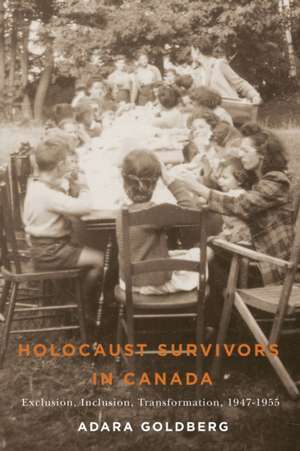Holocaust Survivors in Canada: Studies in Immigration and Culture
Autor Adara Goldbergen Limba Engleză Hardback – 11 sep 2015
Preț: 495.31 lei
Nou
Puncte Express: 743
Preț estimativ în valută:
94.78€ • 99.31$ • 78.35£
94.78€ • 99.31$ • 78.35£
Carte tipărită la comandă
Livrare economică 11-25 aprilie
Preluare comenzi: 021 569.72.76
Specificații
ISBN-13: 9780887552045
ISBN-10: 0887552048
Pagini: 312
Dimensiuni: 152 x 229 x 21 mm
Greutate: 0.59 kg
Editura: University of Manitoba Press
Seria Studies in Immigration and Culture
ISBN-10: 0887552048
Pagini: 312
Dimensiuni: 152 x 229 x 21 mm
Greutate: 0.59 kg
Editura: University of Manitoba Press
Seria Studies in Immigration and Culture
Notă biografică
Adara Goldberg received her PhD from the Strassler Center for Holocaust and Genocide Studies, Clark University. She lives in Vancouver.
Descriere
Highlights the immigration, resettlement, and integration experience from the perspective of Holocaust survivors and those charged with helping them. The book explores the relationships between the survivors, Jewish social service organisations, and local Jewish communities.





